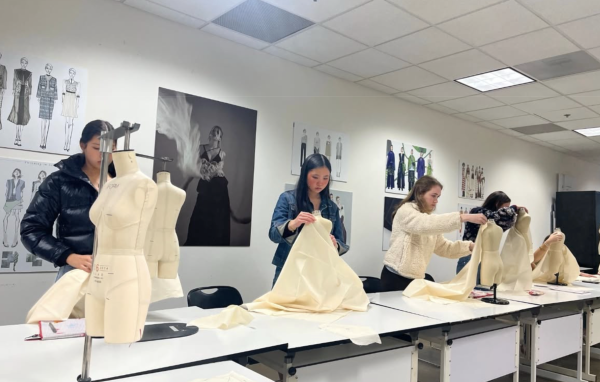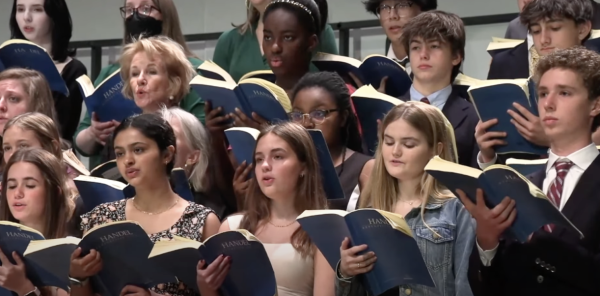All-State provides a platform for talented musicians
Each spring, hundreds of accomplished high school musicians congregate together in an environment flowing with talent to do what they do best: make music. These performances, through a program called All-State, offer high school singers, string players, woodwind musicians, brass players, and percussionists the opportunity to perform at a high level with other excelling students with a fervent passion for music. Hosted each year by the Georgia Music Educators Association, the All-State performances are the ultimate result of a grueling auditioning process for the musicians.
“All-State is an opportunity to collaborate musically with the most accomplished high school musicians in the state,” said Scott Stewart, the director of the orchestra and band programs in the Westminster Upper School. “It is an auditioning process consisting of two rounds of sight-reading, playing scales, and preparing excerpts. If the student passes the second round, he or she will go the All-State band or orchestra convention to perform high level music with a renowned conductor.”
“Imagine that you played on your school’s softball team. Then, imagine playing with all-area all-star athletes. All-State is like that,” said Chris Walters, the chorus director in the Upper School. “The students get to make great music with their peers and are motivated being around determined young musicians while also learning from the conductors and having the opportunity to perfect the music.”
The auditioning process for All-State is quite arduous and requires a large amount of preparation for the musicians trying out. Ultimately, the students must prepare for two different auditions to be placed in an All-State ensemble.
“The first audition is when you sight read and prepare a solo and scales. Practicing your solo with the music directors and practicing sight reading is important for the first audition,” said sophomore Brooke Stevens, who has been in the All-State chorus since the seventh grade. “Then for the second audition, you are given different music to memorize and perform at your audition. As long as you study and prepare for the audition, you will do well.”
Practicing and preparing for the All-State auditions is one of the most important aspects of the process as a whole. The months leading up to the auditions are significant for the musicians to develop their skills musically and technically.
“All-State as a whole is great practice for auditioning in general and having your work judged by a group of people, among many other ways All-State is beneficial for musicians,” said junior Mimi Konieczny, a violinist who has been in the All-State orchestra in past years.
For band students, All-State encompasses two performance opportunities, both locally and statewide.
“All-State band is very unique in that musicians have the chance to not only be in the All-State band but also be in a district honor band,” said senior Adam Liang, a clarinet player. “It is really enriching for band members to have two separate performance opportunities after auditioning.”
Finally, if a talented musician passes both rounds of auditioning, they may be placed in the All-State chorus, orchestra, or band, one of the highest levels of prestige and achievement for high school musicians.
“All-State is really fun because you have the chance to meet many musicians throughout the state,” said Konieczny. “Making connections and friendships with the people involved in All-State is a really important part of the program.”
In addition to being exposed to many other talented musicians, the students who make All-State also have the opportunity to connect and receive mentorship from accomplished conductors from around the country.
“Having a conductor from a different background who excels in their field has helped me grow as a musician because they teach such valuable lessons about being a musician and even about life itself since they have so much experience,” said Stevens.
Not only are All-State students given the opportunity to connect with one another and with their conductors, but being in the ensembles gives the young musicians the chance to explore and expand their interest in music at an early stage of their lives.
“All-State is one of the earliest opportunities for any aspiring musician to have the chance to play with exceptional musicians around the state in a very concentrated environment,” said Liang. “You would otherwise rarely have the chance to play with really great musicians and conductors in high school, so All-State really accelerates your growth.”
With the aid of private teachers and sessions with the music directors in the Upper School, auditioning for All-State is an enriching experience for the young musicians at Westminster.
“All-State is definitely self-motivated and definitely requires a driven student to balance their academics and athletics and also be on top of their auditions,” said Walters. “It is important for the students trying out to not be discouraged if they don’t make it because the auditions are selective and not succeeding could result in growth in the future.”
“I would tell someone thinking of trying out to just go for it,” said Stevens. “If you don’t make it, it is not the end of the world. Your time will come; All-State is just the beginning of an endless amount of opportunities.”



